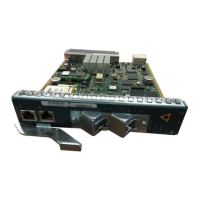2-72
Cisco ONS 15310-MA SDH Troubleshooting Guide, Release 9.0
78-18663-01
Chapter 2 Alarm Troubleshooting
Alarm Procedures
Caution Removing a card that currently carries traffic on one or more ports can cause a traffic hit. To avoid this,
perform an external switch if a switch has not already occurred. See the “2.9.1 Protection Switching,
Lock Initiation, and Clearing” section on page 2-146 for commonly used traffic-switching procedures.
Caution Always use the supplied electrostatic discharge wristband when working with a powered
ONS 15310-MA SDH.
Note When you replace a card with the identical type of card, you do not need to make any changes
to the database.
Step 5 If the alarm does not clear, log into the Technical Support Website at
http://www.cisco.com/cisco/web/support/index.html for more information or call Cisco TAC
(1-800-553-2447).
2.7.97 HLDOVRSYNC
Default Severity: Not Alarmed (NA), Non-Service-Affecting (NSA)
SDH Logical Object: NE-SREF
The Holdover Synchronization Mode condition is caused by loss of the primary and second timing
references in the node. Timing reference loss occurs when line coding on the timing input is different
from the configuration on the node, and it often occurs during the selection of a new node reference
clock. The condition clears when primary or second timing is reestablished. After the 24-hour holdover
period expires, timing slips could begin to occur on an ONS 15310-MA SDH relying on an internal
clock.
Clear the HLDOVRSYNC Alarm
Step 1 Clear additional alarms that relate to timing, such as:
• 2.7.84 FRNGSYNC, page 2-65
• 2.7.85 FSTSYNC, page 2-65
• 2.7.97 HLDOVRSYNC, page 2-72
• 2.7.119 LOF (BITS), page 2-85
• 2.7.133 LOS (BITS), page 2-93
• 2.7.153 MANSWTOINT, page 2-106
• 2.7.154 MANSWTOPRI, page 2-107
• 2.7.155 MANSWTOSEC, page 2-107
• 2.7.156 MANSWTOTHIRD, page 2-107
• 2.7.213 SWTOPRI, page 2-133

